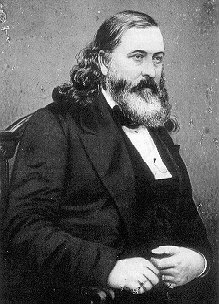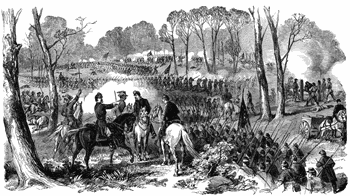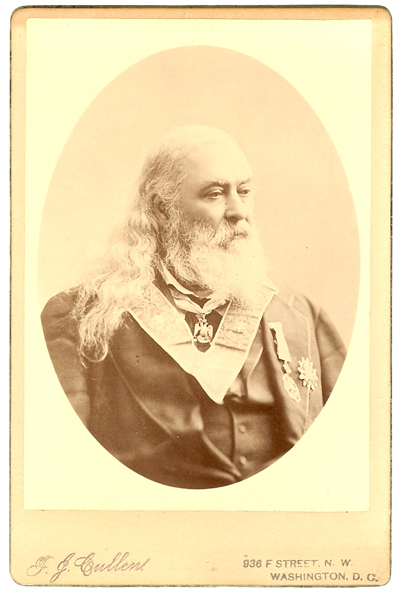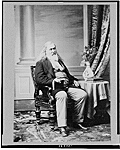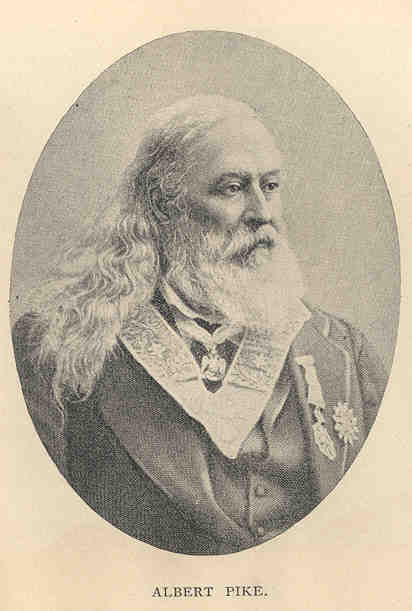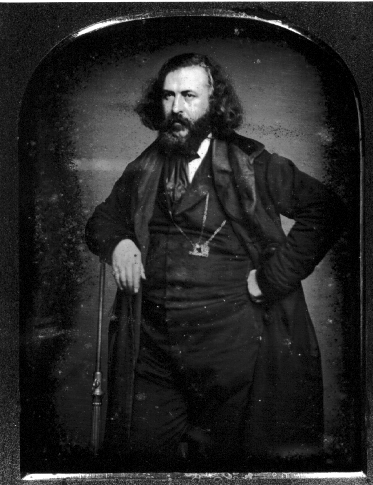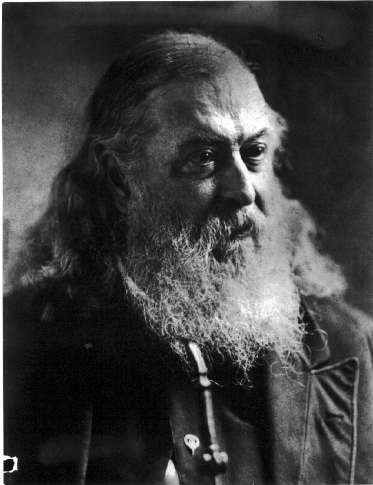|
Albert Pike
Albert Pike, a lawyer, brigadier general in the Confederate army, teacher, poet, newspaper editor, and author of Freemasonry texts, was born in Boston on December 29, 1809. When he was four his family moved to Newburyport, Massachusetts, where Pike spent his youth. He began Harvard but the family had no means to support his education and Pike became a teacher and then principal of the Newburyport Academy. After teaching at the Academy and elsewhere, he took up with some seriousness his education with private study. In the spring of 1831 he left Massachusetts for the West. After walking some good part of the way, in St. Louis he joined a trading party (of some forty persons) on its way to Santa Fe. It was November of the following year when he arrived in Santa Fe and was able to support himself by working as a clerk in a store and as a traveling merchant. In 1832, traveling with trappers, he visited various remote areas, and then with four others struck out for Arkansas. He spent that winter teaching, and later took on the editorship of Arkansas Advocate at Little Rock. In 1834 he became the owner of that paper, but sold it in 1836 and took up the practice of law, having undertaken its study while he was in the newspaper business. Pike engaged in the practice of law until the Mexican War where he was served with a regiment of the Arkansas Volunteer Cavalry. After the war, Pike resumed his law practice. In 1849 he was admitted to practice before the Supreme Court of the United States along with Abraham Lincoln. In 1853, Pike moved to New Orleans and again took up the practice of law but returned to Arkansas in 1857 and practiced law there. Pike represented, among others, the Choctaw Indians, and assisted by other lawyers obtained for them an award of almost $3,000,000 from the US Senate. Pike was an Indian Commissioner for the Confederacy and led a brigade of Cherokee Indians at the Battle of Pea Ridge in 1862.
Frank Leslie's Illustrated Famous Leaders and Battle Scenes of the Civil War Like a good number of Southerners, he was opposed to secession, but unwilling to support the Union cause. Pike's military command was marred by various allegations and he eventually resigned his commission. The allegations followed his retirement as a solider and he had trouble from both Confederate and Union sympathizers. After the war he moved to Memphis, Tennessee and took on the editorship of the Memphis Appeal. The next year he moved to Washington, D.C. and practiced law there until 1880. Pike was an active Mason and is known today among Masons for his philosophical writings and his scholarship on Masonic rituals. Pike achieved the highest rank of any Masonic dignitary in the United States. He died in the house of the Scottish Rite Temple, Washington, D.C. on April 2, 1891 and is buried in Oak Hill Cemetery.
W.H. Venable in Beginnings of Literary Culture in the Ohio Valley notes that:
[W. H. Venable, Beginnings of Literary Culture in the Ohio Valley: Historical and Biographical Sketches 92 (Cincinnati: Robert Clarke & Co., 1891) [online text] Venable notes that Pike rank in the Masonic order was Grand Commander of the Scottish Rite Masonry of the Southern Jurisdiction and Chief of the Royal Order of Scotland for the United States. He was reported to have had one of the extensive libraries in the South. In the last decade and a half of his life he translated some twenty volumes of Sanskrit texts into English. Venable quotes one commentator as having said that "If General Pike had given the same time and erudition to the world of literature, instead of to the secret order of which he was the head [the Masons], his name would, undoubtedly, have been classed with the Ruskins, Emersons, and Carlyles."] [The sketch of Pike's life up until the Mexican War is drawn from Evert A. & George L. Duyckinck, The Cyclopedia of American Literature 383(Philadelphia: William Rutter & Co., 1880)(Vol. 2)]
PERSONAL.
Albert Pike Albert
Pike Albert
Pike Albert
Pike Civil
War Songs: Dixie & The Battle Hymn of the Republic Poets
of the Civil War Tresner's Albert Pike, The Man Beyond The Monument
Log Cabin Schoolhouse where Albert Pike Taught School in 1832 Poems
Video James T. Tresner: A Visit with General Albert Pike Poetry Albert Pike, Prose Sketches and Poems Written in the Western Country (Boston: Light & Horton, 1834)(Albuquerque: Calvin Horn Publishers, 1967)(Texas A&M University Press, 1987)(David Weber ed.) _________, Hymns to the Gods and Other Poems ([New Orleans], 1870)(Privately printed, 1872)([Washington, D.C.], 1882)(Little Rock, Arkansas: Fred W. Allsopp, 1916) _________, Gen. Albert Pike's Poems (Little Rock, Arkansas: Fred. W. Allsopp, 1900) [online text] _________, Lyrics and Love Songs (Little Rock, Arkansas: Fred W. Allsopp, 1916)
Writings Albert Pike, Reports of Cases Argued and Determined in the Supreme Court of the State of Arkansas, in Law and Equity (Little Rock, Arkansas: Printed by Budd and Colby, 1840, 1845)(5 vols.)(Little Rock: Press Print. Co., 1888, 1889) [vol.2 :: online text] _________, Morals and Dogma of the Ancient and Accepted Scottish Rite of Freemasonry (Charleston, 1871)(New York: Masonic Publishing, 1874) [online text] _________, The Proch and the Middle Chamber, the Book of the Lodge ([S.1: s.n., 1872) _________, Letter of Albert Pike to the Choctaw People (Washington: Cunningham & McIntosh, printers, 1872) _________, Foulhouzeism and Cerneauism Scourged: Dissection of a Manifesto (New York: Press of J.J. Little, 1884) ________, The Point Within a Circle, a Lecture (Lexington, Kentucky: Lexington Class in Symbolism, 1911) ________, Narrative of a Journey Across the Plains (Conway, Arkansas: Arkansas Historical Association, Conway, 1917) ________, What Masonry Is And Its Objects (New Orleans: A. W. Hyatt Stationery Mfg. Co., 1919) ________, The Meaning of Masonry (Washington, D.C.: Masonic Service Association of the United States, 1924) ________, Irano-Aryan faith and Doctrine: As Contained in the Zend Avesta (Louisville: Standard Printing Co., 1924) ________, Indo-Aryan Deities and Worship as Contained in the Rig-Veda (Louisville: Standard Printing, 1930) ________, Lectures of the Arya (Louisville: Standard Printing Co., 1930) ________, Report of Albert Pike On Mission to the Indian Nations, Richmond, 1861 (Washington, D.C.: Supreme Council, 1968) ________, Pythagoras & Hermes (Edmonds, Washington: Holmes, 1993) ________, The Book of the Words (Kila, Montana: Kessinger Pub. Co., 1996)
Bibliography Robert Lipscomb Duncan, Reluctant General The Life and Times of Albert Pike (New York: E.P. Dutton & Co., 1961) Fred W. Allsopp, Albert Pike: A Biography (Little Rock: Parke-Harper, 1928) _____________, Life Story of Albert Pike (Little Rock: Parke-Harper News Service, 1920) Jim Tresner, Albert Pike: The Man Beyond The Monument (New York: M. Evans and Company, 1995) Walter Lee Brown, A Life of Albert Pike (Conway: University of Arkansas Press, 1997) Albert Pike's Journeys on The Prairie Canyon (Texas: Panhandle-Plains Historical Society, 1969)(J. Evetts Haley intro.& notes) Journey's in the Prairie 1831-1832 (Canyon, Texas: Panhandle Plains Historical Society, 1968)(J. Evetts Haley intro. & notes) Wlliam L. Boyden, Bibliography of the Writings of Albert Pike (Washington, D.C.: Supreme Council, 1921) Ray Baker Harris, Bibliography of the Writings of Albert Pike (Washington, D. C.: Supreme Council, Centential ed., 1957) Bibliography: Articles Walter L. Brown, Rowing Against the Stream: The Course of Albert Pike From National Whig to Secessionist, 39 (3) Arkansas Historical Quarterly 230-246 (1980) _____________, Albert Pike and the Pea Ridge Atrocities, 38 (4) Arkansas Historical Quarterly 345-359 (1979) Mark Keller & Thomas A. Belser, Jr., Albert Pike's Contibutions to The Spirit of the Times, including His "Letter From the Far, Far West," 37 (4) Arkansas Historical Quarterly 318-353 (1978) A. M. Gibson, Confederates on the Plains: The Pike Mission to Wichita Agency, 4 (1) Great Plains Journal 7-16 (1964) Nancy Snell Griffith, Buena Vista: The Controversy in Verse, 60 (1) Arkansas Historical Quarterly 75-85 (2000) Thomas W. Kremm & Diane Neal, Crisis of Command: The Hindman/Pike Controversy Over the Defense of the Trans-Mississippi District, 70 (1) Chronicles of Oklahoma 26-45 (1992) James C. Milligan, Fort McCulloch, Indian Territory: Gray Command on the Blue, 7 (2) Red River Valley Historical Review 17-27 (1982) Susan B. Riley, An Early Appearance of the Classic-Romantic Ode: Albert Pike's "Hymns to the Gods," 22 (4) Arkansas Historical Quarterly 351-364 (1963) Research Resources Albert Pike Papers Western
Poetry, 1850-1950
|
